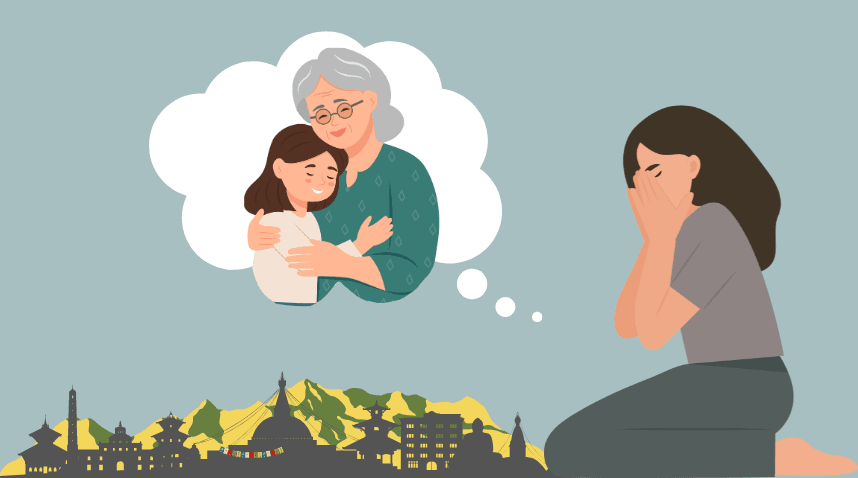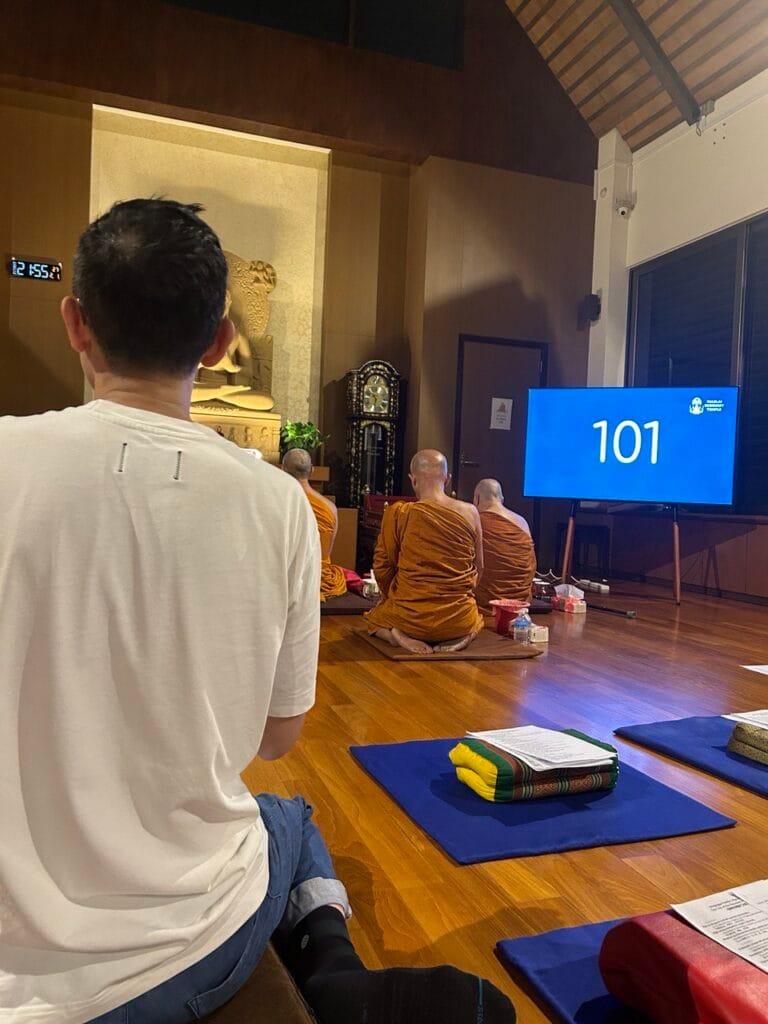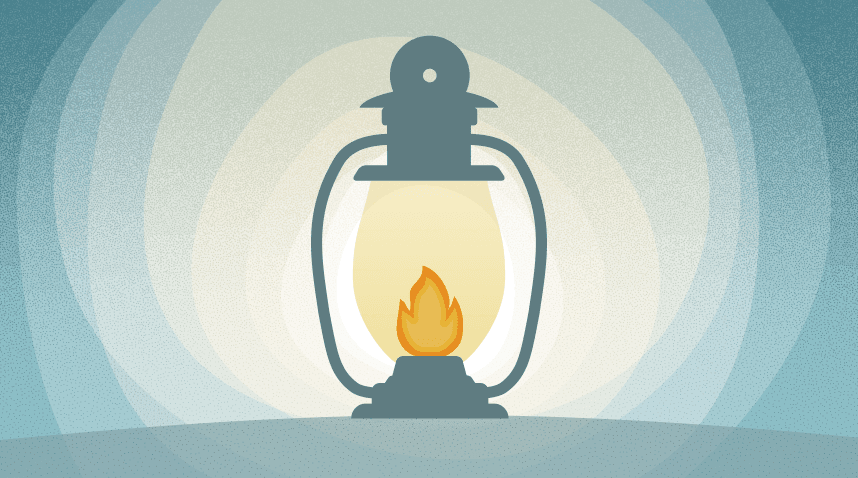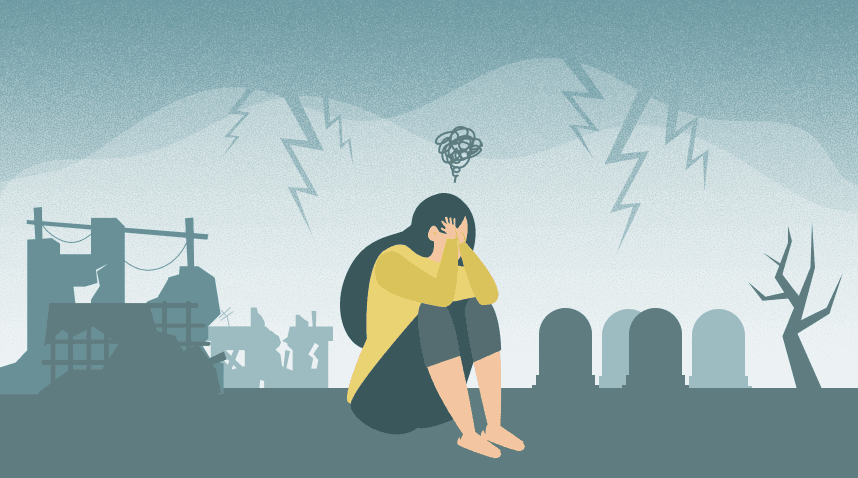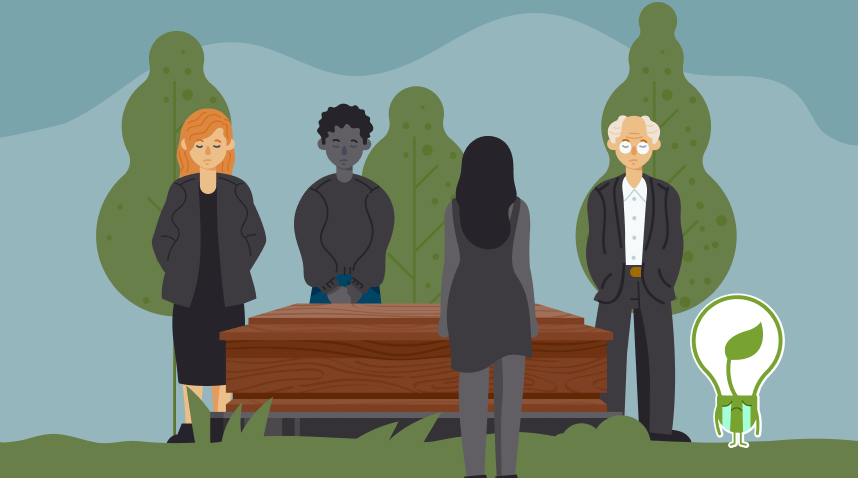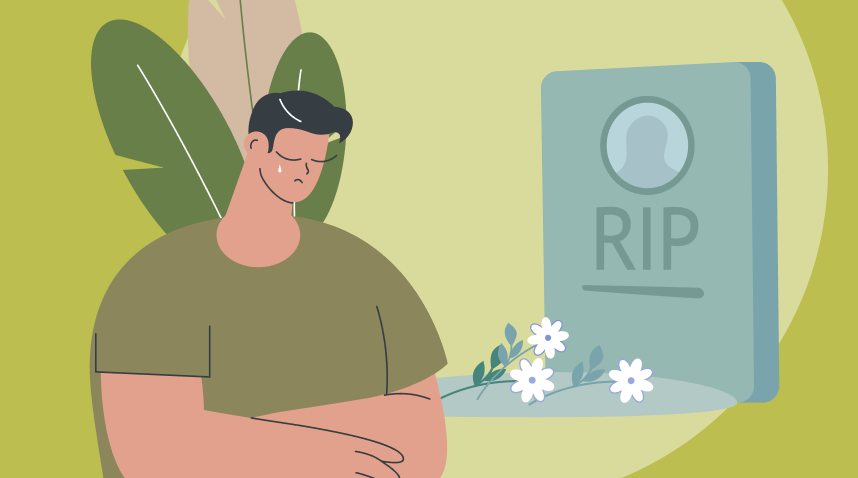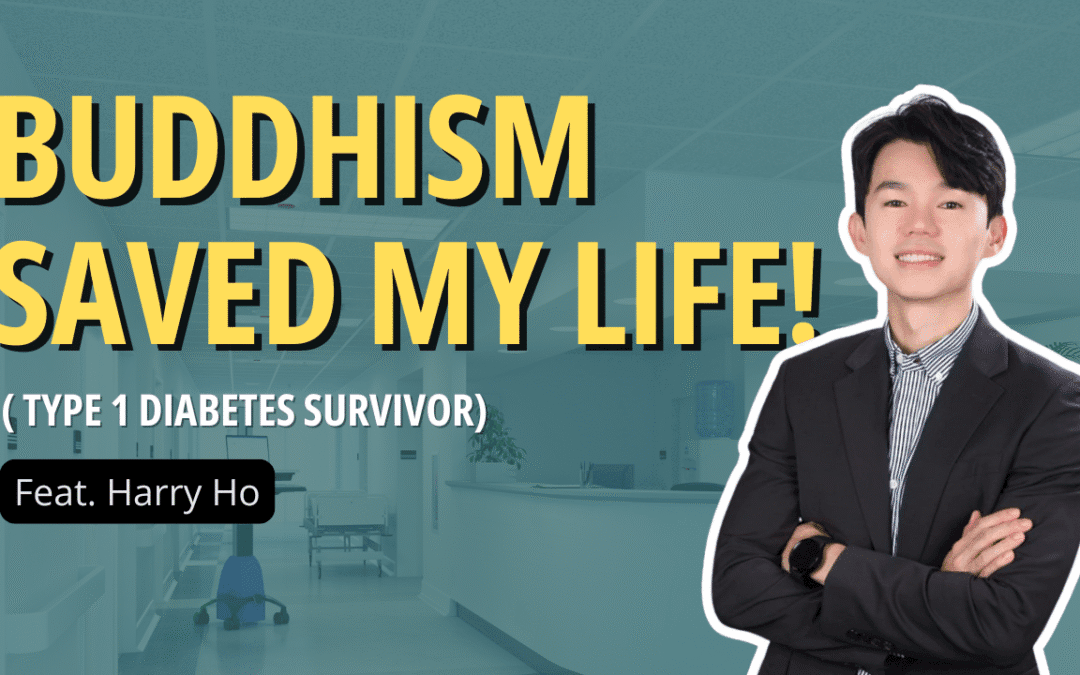
Ep 59: Buddhism Saved My Life ft. Harry Ho
Summary
In this moving episode, Hary shares his journey through profound loss, chronic illness, and emotional burnout. Through the practice of Buddhism and meditation, he finds a path to healing, resilience, and self-compassion. His story is a testament to how the Dhamma can illuminate even the darkest chapters of life.
About the Speaker
👤 Haryono (Harry) is currently Senior Director in P&G, he has 14 years of experience working across APAC markets and lived across Singapore, Indonesia and Philippines. He had near death experience, having coma during his teenage life and now living with type 1 diabetes. Buddhism has helped him understand that there is always peace in whatever suffering and unhappiness with regards to mind and body and it’s up to us on how to make sense of it.
Key Takeaways
Self-kindness is foundational
Responding to suffering with compassion instead of self-blame begins the healing process.
Meditation builds inner strength
Regular practice helps manage emotional and physical pain by observing thoughts non-judgmentally.
The Dhamma offers practical tools
Buddhist teachings, when embodied, provide resilience, clarity, and a pathway out of mental suffering.
Transcript
Full Transcript
[00:00:00] Hary: I thought that going to university, new chapter of life but it turns out to be a four years of nightmares.
[00:00:08] Hary: Two months after I moved, my mom passed away. Even more difficult is I didn’t know that my mom passed away. My family doesn’t wanna tell me because they thought that it will ruin my study. So I ended up learning it from my friends.
[00:00:26] Cheryl: Welcome to the Handful of Leaves podcast, where we share practical Buddhist wisdom for happier life. My name is Cheryl, the host for today’s episode where we will be speaking with Hary.
[00:00:37] Hary: Hi Cheryl. Thank you for having me.
[00:00:39] Cheryl: And so today we will be speaking about how the Dhamma, the Buddha’s teachings, saved Hary’s life and how it helped him through his life crisis.
[00:00:53] Cheryl: So Hary, can you give us a quick introduction about yourself to get to know you?
[00:00:59] Hary: Hi everyone. I’m a survivor of Type one diabetes. So I’m 35 now, I’ve been living with diabetes for 16 years now. I was born a Buddhist, but I never really understanding Buddhism.
[00:01:11] Hary: I still remember childhood a lot of happy memories as well, but a lot, a lot, a lot of painful memories.
[00:01:18] Hary: When I was still young, my loved one, my grandparents, each one of them passed away. My mom was a gambling addict, and she will fight a lot with my dad. Sometimes they like scream at each other. All the neighbors will hear about it and there will be times when me and my brother just crying about it. But there’s also a lot of happy memories, right? The love of your grandparents, and when you’re sick, your mom is taking care of you.
[00:01:44] Hary: So it’s a mix of both, and that’s how life is. When I was young, there was always one thing where I found peace and I couldn’t understand it until now when I learn about Dhamma. somehow I just love rains. When it’s raining I will just pull a chair, outside of the house and just be with the rain. Enjoying the breeze of the rain, the sound of the rain, and the peace of not being anyone, not have to worry about the future, thinking of the past. Only now that I know that it’s a form of being mindful.
[00:02:15] Hary: So I moved to Singapore when I was 17. But then that was the four years in university was one of the toughest period of my life. And diabetes is one of them.
[00:02:27] Hary: But diabetes is not the only thing. My mom has been sick for a really, really long time. Two months after I moved to Singapore , my mom passed away. Even more difficult is I didn’t know that my mom passed away. My family doesn’t wanna tell me because they thought that it will ruin my study. So I ended up learning it from my friends.
[00:02:47] Cheryl: How did you take that in when you heard from your friends?
[00:02:50] Hary: I was just crying in a very devastating state of mind. It was very painful memory. Like even now, the painful memory still bring up the unpleasant feelings. Then I quickly book the tickets back at home so that I can attend the funeral and say my last goodbye before all the burial and stuff.
[00:03:09] Hary: And that was like death keep coming up, right? Always something that I was always dreadful about, sometimes to the point that I felt that it’s easier for us to die than seeing our loved one die.
[00:03:21] Hary: And then after that, my medical complication is just gone worse. Six months before I was in coma for diabetes, I was infected with tuberculosis, I will feel pain after just 15 minutes of walking. After 30 minutes of walking, it’ll be unbearable pain. I thought that going to university, you know, new chapter of life but it turns out to be a four years of nightmares where there’s a lot of suffering.
[00:03:47] Cheryl: While all of that hitting you at a very, very young age. How did the Dhamma, that was just a theory became meaningful to you?
[00:03:56] Hary: I didn’t really found out Dhamma until I was probably at my breaking point, right. I remember I have to sort of like injecting myself every time I go out lunch and dinner with friends.
[00:04:07] Hary: And the emotional swing from high blood sugars, low blood sugars, I couldn’t really understand how it affected my emotions. So I went into a state of depression. But I was able to move out of the depression by telling myself that life is so unfair. If life is so unfair, I have to work five times harder to be able to compete with other people.
[00:04:31] Hary: I was able to move a bit of from the depression, but by putting a lot of more self pressure. But think about it, that, that just make you self criticize, putting a lot more stress on yourself.
[00:04:44] Cheryl: But at the short term, it seems to be the best coping mechanism. Correct? Correct. But for the long term, it just burnt you out all the way.
[00:04:51] Hary: Exactly, and it really did happen, right?
[00:04:53] Hary: I was lucky enough to join P&G. It is a good company, treated me extremely well, but work can be very stressed, so that bottle up stress eventually exploded. I could not sleep well. When I go into meeting and when the meeting doesn’t go well, I would like overthink and self criticize.
[00:05:13] Hary: I should have said this, I should have said that. I should have prepared this, should have prepared that. And I keep thinking and lingering over and over to the point that I don’t sleep. I don’t have time to go out with my friends anymore and then that was the moment in time I felt like life is just — on top of all the suffering that you already have with the mental suffering, I was like “why is life worth living?”
[00:05:34] Hary: And why do I have to go through every day? Then one point in time I said that, guys, this is so unbearable, I need to find a cure. Then, probably this is coincidence in life that I went to a talk and the talk topic was how the mind works. It was talked by one of the Buddhist practitioners in Singapore.
[00:05:54] Hary: She actually talk about how the mind create all these suffering and how, if we are not being too personal with it, we don’t need to suffer this much. And somehow it just resonate with me that everything that I created is really self-created. It’s not because of external environment. And then I talked to her after the talk.
[00:06:15] Hary: So I said that, Hey, I’m so unhappy in life. What is your suggestion? And her advice is so simple. Say that “Hary, you just need to strengthen your mind so that you are not caught up into this mental suffering.” The only way to do that is that you need to strengthen your mind through meditations. And she gave an analogy about preparing for marathon. If you never run for a marathon and you try to run for a marathon, you’re never able to do that, right? It will be a massive suffering because your body is just not built to it, right? Same with the mental suffering. So she told me that, Hary, I just started a Friday meditation class in the evening.
[00:06:54] Hary: Why don’t you try to join? So I started to go to the Friday meditation class and I try to do it every day. And gosh, it’s so difficult to meditate.
[00:07:07] Hary: Especially when you just love thinking, love solving problem, love to create. So your mind just couldn’t stop thinking. And then I always felt that I practice very diligently. I do it every day. And I get nothing after putting so much effort. But there was one night I was telling myself that, after all the effort that I give, if it doesn’t work, it’s okay.
[00:07:29] Hary: And that night when I was meditating, my mind went into a very deep concentration zone where it was just all contentment.
[00:07:38] Hary: There’s no thinking and it’s just so nice. And when I came out of the meditations, that’s where everything is just in slow motions and she then talked more about there is a Buddhism learning that you have to experience and learn. And that’s how I learned more about Buddhism and how my journey to practice started.
[00:07:59] Cheryl: This is really, really incredible and your experience where you let go of all the expectations to get a calm mind just reminded me of Venerable Ananda striving for enlightenment. After the Buddha passed, he was rushing to get enlightened before the, you know, the First Buddhist Council. And. Whole night. Right? The whole night. He was just trying so hard to get enlightened. And then when he kind of, semi gave up, right? He just put his head down to the pillow and then the moment his head touched the pillow because of all that letting go, he just achieved enlightenment.
[00:08:32] Hary: Exactly. And, it’s like when we read it, it’s like stories, but when you learn more Buddhism, it’s really about letting go, letting go of craving, clinging, the self, the self-view, investigating internally then, operating externally as like there is a being with an external world.
[00:08:51] Hary: So, so yeah, that’s the power of Buddhism and the power of the Dhamma where it encourage investigations. When you experience it, you start to like, oh, so that’s what it means. And then it gives you a lot more courage and understanding that there is a path that can really end the suffering in this lifetime alone.
[00:09:09] Cheryl: So I want to understand, from the first time you attended the talk and your first experience of stillness what shifted in you and how did you then relate to your suffering differently after that? Because the diabetes still remains, you are still currently having, right?
[00:09:28] Hary: Yeah. And again, the stillness is just a momentary stillness. Then after that, when the stillness disappear, life, the suffering still back, right? But at least it gives me a confidence that there is that moment where I don’t feel much suffering, but I only feel contentment.
[00:09:46] Hary: So that was the first time where I said that, you know what? I’m gonna study Buddhism really, really intensively. I went for Buddhism 101. I spend my Saturday, Sunday learning Buddhism and go for more meditation classes, and put more intention and intentionality and use my weekends within that, right? Then when you’re able to meditate longer in time, you are able to see how just the mind works in more minute parts right? Now, how does it help with the diabetes management? It helps with a lot of self control, right? Because when you are someone who’s lived with diabetes, first of all, you need to maintain a very healthy lifestyle, so even though there is so many good food in the world, you have to put a lot of restraint.
[00:10:31] Hary: Even though when craving arises, you know, don’t go into that craving. How do you see how the mind works and then how do you put more discipline by just watching the mind more and then let go of your craving of all the nice food that is poisonous to you. More importantly, diabetes is not something that caused me a lot of suffering to be very honest, because I felt like the mental suffering from all the things that have happened is so much more for me than my bodily sort of like pain, discomfort.
[00:11:05] Hary: So Buddhism for me, really, really take me out of that cycle of mental suffering. I’m still suffering day on day, there is still things that cause unhappiness in life, but Buddhism helps me to not get cling to that mental state.
[00:11:22] Hary: So for example, you go to work, it didn’t go as per your plans, when that unhappiness started to come, the self criticism come again and then just see that, it just arises and then just watching it. And rather than keep giving a lot of story and energies to the thought, you just let it go and watch it, and then slowly disappear.
[00:11:41] Hary: And that’s where I can live daily, having a lot more contentment and that’s how Buddhism kind of like pulled me out from that cycle of suffering.
[00:11:53] Cheryl: I’m just curious at this stage of your practice what do you think is an aspect of Dhamma, which you still find difficult to apply in your daily life, especially when the mental suffering that arises is very strong?
[00:12:11] Hary: I realize that it will become stronger if I do not keep my practice. But remember, I used to give a lot of excuse why I could not practice.
[00:12:19] Hary: But the last retreat in December where I was with Luang Por Viradhammo retreat in Malaysia, somehow just give me a new determination that, you know what, I will stick with the practices from now on. There is no more excuses, no matter how hard it is, right? So since then, I try to always wake up in the morning, even though it’s tiring to, you know, meditations right?
[00:12:50] Hary: Making coffee in the morning. It’s also the time to practice, right? Because I kept being reminded by many senior monks, they say that, hey, you don’t really need a time to meditate. You can also meditate by doing your daily activity. Because the idea of meditation is really about watching the feeling of the mind, the emotion of the mind. And these days what I like to do is just keep watching on the heart.
[00:13:12] Cheryl: What do you mean watching the heart?
[00:13:14] Hary: Watching the heart is not the physical organ of the heart. In Pali, they call it Citta, some of the monks call it the mind, some of it call it the heart. I found it, it’s a lot more closest to the heart because when we are stressed, there is a lot of compressing energies in this area. So when I was watching the heart, just keep it opened, right? If there is pleasant and unpleasant feeling, rather than pushing it away, I just watch it and accept it in the heart.
[00:13:46] Hary: It helps a bit steady the emotions more throughout, there’s a lot more kindness because you just stay in the heart, right? And somehow I find heart… there’s a lot of kindness in the heart, you can be a lot more kinder to also other people.
[00:14:01] Hary: And you tend to accept both the unhappiness and the happiness without attaching to both the pleasant and unpleasant sensation.
[00:14:10] Cheryl: you know, I’ve heard Ajahn Jayasaro share that the equation of suffering “S” = “P” x “R” And “P” is pain, r resistance or the non-acceptance of it multiplies the pain equals suffering.
[00:14:25] Cheryl: And with that equation, there is actually a situation where you can have pain, but because you have zero resistance, you can actually have zero suffering.
[00:14:38] Hary: Absolutely, and I can attest to that. When we practice over time we keep learning new things.
[00:14:43] Hary: There was one time where, I think I was pretty good at meditation because I practice a lot and when you’re good in meditations you are like, oh, there is like unpleasant feeling, push it away. You try to kind of like bury it right with a lot of your mental strength, but I realized that it never really helps.
[00:15:02] Hary: It helps on that momentary in time, but it will always come back and it come back typically stronger. Same thing with bodily pain. When you’re meditating, you have like a leg pain. When you’re like, oh, leg pain, you go away. I will just stay in awareness because I don’t like you.
[00:15:18] Hary: And the, the pain tends to become multipliers because it will come back. But when you’re just accepting it, like I said, like open the heart and be kind to the pain because the pain always there, the pain just much, much lesser because you are accepting it. You are allowing it to be present.
[00:15:37] Hary: But you are not attaching yourself that I am in pain. There is just a pain. There is a bodily sensations. And one of the trick that I also do for people who are practicing quite well for the eight precept, right? Where you only eat once a day and then you don’t eat anymore. You’ll feel hungry, right? And that is unpleasant sensation. So if you accept the feeling of hunger because you know, hunger will arise because there is a condition to it, right?
[00:16:03] Hary: Then you perceive that as hunger, and then you’re just allowing that to come in, and then when the hunger feeling dissipated, it’s just a warm sensation on the stomach. That’s what I felt that just allowing it to come rather than pushing away.
[00:16:18] Hary: Because when you say that, oh, I’m hungry, or I’m so miserable with hunger, it will just multiply that again. You’re giving it a lot of thoughts, a lot of energies.
[00:16:27] Cheryl: All the suffering comes when we attach to the sensation and start to add the likes and dislikes, thoughts about it, opinions about it, and that’s where we suffer.
[00:16:37] Cheryl: But if we just simply boil it down to the essence, it’s really just a sensation that arises, exist for a while, and it ceases, nothing more to that.
[00:16:45] Hary: Right. Yeah, it’s an analogy of illusions. There are external things that happens to us, but we creating a lot more illusion or what I call as unnecessary illusions and storytelling that create that suffering. When you are in that zone, why don’t you just say that, hey, there’s just a storytelling that is happening to yourself, and it’s just a story, right? Don’t take so much of meaning about it. Just stop, you know, believing in that story.
[00:17:12] Cheryl: And I want to ask you now, with the inner resources that you have built to take care of your heart and yourself, what would you tell yourself in the darkest moments in your life?
[00:17:23] Hary: I don’t think I have that darkest moment anymore. And that’s why I believe that the Dhamma pulled me out of that darkest moment. Yeah there is a bit of suffering here and there, but it’s a momentary suffering because you can, with Dhamma understanding, you can just like understand suffering as just suffering.
[00:17:41] Hary: And suffering also arises and passes away. And when it passes away, then there is no more suffering. When you see the Dhamma, you understand the Dhamma, the power of the Dhamma. I will not trade anything in the world for it.
[00:17:56] Hary: So for example, I have a late night call. A lot of business problem to solve, and then my mind go into like, oh, like stress. Then I remember that, you know, the work day is already end. I cannot solve it now anyway, so just compartmentalize it, putting it away, and meditate.
[00:18:16] Hary: Just be with my present, watch the heart and then just go to sleep. And then the day arises, Monday’s gonna come, the problem’s gonna be there, will come again. Then you understand that it arises, let it arise in the heart, and then slowly it will die down from the heart, and then you go on and live life in more contentment.
[00:18:36] Cheryl: Where you’re at now, what would you tell the you who first found out about your mother’s passing away? What advice or what comfort would you offer?
[00:18:47] Hary: I will tell myself that, I’m sure you have a lot of suffering right now. It’s okay to suffer. Because at that point in time when there is a lot of suffering, because of obviously losing someone that is very close to you, create a lot more suffering in the feeling of regret. Regret of, I could be kinder to my mom, I could be nicer to my mom. I could call her more often from Singapore. A regret of leaving her in pain.
[00:19:20] Hary: So I’ll tell myself that you are in a lot of suffering. It’s okay. Be kind to yourself. You cannot change the past. Don’t let the past eat you. I’m sure that you can do better, but you know it’s already done. So falling into the place of regret and keep thinking about where you should have, could have done better doesn’t really help.
[00:19:46] Hary: So just be kind to yourself.
[00:19:47] Cheryl: Thank you for sharing that, Hary. And now, what does a meaningful life mean to you and how do you make your life meaningful every single day?
[00:20:00] Hary: Meaningful life to me is being content at every single time, at every single moment to be very honest. I know a lot of people have a lot of bigger sort of like mission in life, want to elevate suffering of a lot of people. For me, maybe because I’ve also seen a lot of suffering in myself, my first mission is to remove that as much as I can while also helping other people as much as I can.
[00:20:28] Hary: But where meaningful life to me is be more and more content with life, be less and less personal with life. I always think about this life, that started after 19 years when I almost died, is my second life. In a weird way, I do not fear about death anymore because it’s my second life, right?
[00:20:51] Hary: So whatever additional day I have until that is an incremental life that I had in this world. But I do want to practice as much as I can to see the Dhamma and the deeper part of the Dhamma so that we can live life that has more contentment. When you see a lot of all the very senior monk who practices all the way through their entire lifetime, for me, I’ve never seen people who are as happy and as content as them. Even though they’re old, even though they are having a lot of suffering, right? With the aging and health problem. I want to be like them, so light and I don’t think there’s anything that bothers them. They still feel unpleasant feeling, they still feel pain, but they’re just not bothered by it. Right? So that’s my goal in life. I wanna be more like them so they become an aspiration.
[00:21:43] Hary: While we heard a lot of stories about the Buddha, I’ve never seen the Buddha. I know he exists, but I cannot see that. But that is how I project, like if a Buddha would have experienced life, it’s like the embodiment in them, and that’s how the Buddha, the Dhamma and the Sangha cultures continue. And the Sangha members are the people who you truly respect. And it give you an aspiration that what is the fruit of practice will be right here and now in the present moment.
[00:22:11] Cheryl: Yeah. And I think here and now is something that is so particularly inspiring that the Buddha walk the Earth 2,500 years ago. But yet today in 2025, we still see people who practice the Dhamma well, embodying such beautiful qualities and that we can also be able to cultivate and train ourselves to that level.
[00:22:31] Hary: Absolutely, absolutely right. So when Ajahn Chah always mention about when you’re breathing, you can meditate anytime. You can be content every time, right? So yeah, we have a long way, journey to go to slowly let go of the things that bond us to suffering.
[00:22:48] Cheryl: What is something that you still find difficult in letting go at this moment?
[00:22:55] Hary: Bodily pain is still extremely hard because I have a bit of scoliosis, so sometimes when I sit too long the pain can be quite unbearable.
[00:23:05] Hary: The ego also can be very hard in terms of the work context. Because we all want to achieve something, and we don’t like to be blamed on something, right? So I think that ego it’s still there, you always want a nicer output.
[00:23:23] Cheryl: It’s like the eight worldly winds, but we only want four of it. All the good stuff.
[00:23:27] Hary: Yes, yes, yes, yes. You know, where I started to make more of the daily practices, I remember that business was very tough at work. There’s just a lot of debates with the leadership teams, and everyone’s, when debating the egos is like very strong, right?
[00:23:45] Hary: So one of the things that I’m practicing right now is to be extremely kind. And don’t put my own ego in that conversations, right? So always there like, Hey, how can I help you? Why do you feel that way? And then I realized that people respond with kindness. Rather than when you try to debate because you try to prove your point is better.
[00:24:07] Hary: So these days I try to let go as much as I can. Try to be kind to that person and they responded. And I found that, that in a difficult environment, they’ll respond the kindness, it become like, oh, I can understand your point of view.
[00:24:23] Hary: Here’s my point of view. How do we work? And then sometime my colleagues say that, how come the boss doesn’t flip on you? But it flipped on us even though I was bringing the same point.
[00:24:34] Hary: But I always told them that, perhaps I just speak it slow. There’s not much of intention of debating.
[00:24:40] Cheryl: you are saying the exact same thing that your colleagues are saying. Just your whole intention is much more wholesome. So the way it’s received is also a lot more open, a lot more collaborative.
[00:24:51] Hary: Correct. When you speak with kindness, the first thing that will happen more is that you smile more also when you make your point, right? And when you are a bit more mindful also with the kindness, you tend to speak slower so that you can see other peoples’ body reaction better. Then when they want to speak, you can already start pausing rather than keep going on the train journey of like sharing your idea. So then you allow people to comes in naturally and then there is real discussions instead of it become a debate.
[00:25:22] Hary: So that was what I found was sort of like a new interesting Dhamma practical application in a stressful work environment.
[00:25:31] Cheryl: I just recall one very tense conversation I had with a manager and she was getting very emotional. She was raising her voice and starting to use a lot of accusation. I was just being very mindful, speaking deliberately, very slowly and in a calm tone and opening the conversation into how can we solve this problem? And after a while, she was able to calm herself down and then she realized, oh, she’s really reacting too over emotionally, and that then her focus came back to the right thing, to the problem at hand.
[00:26:06] Cheryl: It really does work and, and people really react to the way that we try to show up.
[00:26:12] Hary: Correct. And that’s another example of the Dhamma practical applications that has fruits in it. Right. That we can see here and now.
[00:26:20] Cheryl: And is there a final, a key message that you want to share with our listeners today?
[00:26:27] Hary: I only have one advice — Always be kind to yourself, no matter how bad hardship and suffering that you face. You have two options. Either blame yourself or you can be more kind to yourself. You know, I preferred the second one over the first one because I tried the first one.
[00:26:47] Hary: And it didn’t really help. And I went to even more suffering because of that. So whoever you are there who are facing some challenges start always, always by being kind to yourself.
[00:27:01] Hary: And then hopefully some of you who are practicing the Dhamma can use the Dhamma to kind of like alleviate a little bit of the suffering day by day with your practice.
[00:27:12] Cheryl: One way I have been practicing being kind to myself, is actually just starting the day by acknowledging the good qualities, acknowledging the effort that I try in times that are difficult or in areas that I’m struggling or not yet good at. And just taking a moment to realize, ooh, it’s not easy at all.
[00:27:33] Cheryl: And that the fact that I’m still showing up, I’m still putting effort. It’s deserving of a pat on the back.
[00:27:39] Hary: Absolutely. And then also you can also think about things that are, you’ve done good, right? Those of you who practice generosity to other people, you can also reflect that, right?
[00:27:50] Hary: Hey, you’ve done good in life. Give yourself pat in the back. Or sometimes, by the way, I also like to do this when I’m extremely stressed: I say that it’s okay, then I go back to my breathing.
[00:28:01] Hary: If I cannot go, if I cannot go to my heart, automatically, I’ll just do this. It’s okay. Life will be okay. You know, all this suffering will be okay. You’re not alone. Right? And I tell myself that, you know, I’m here with you whatever that suffering is.
[00:28:15] Cheryl: You know, just putting my hand here, I already just feel so so, so comfortable and so soothed. so yeah, thank you for sharing that as well. And thank you for sharing about your journey and it’s extremely inspiring how you have gone through basically a 360 degree change in your mindset in how you view suffering as well. So to all our listeners, thank you for staying to the end as well. So stay tuned and join us in our next episode. Stay happy and wise.
Special thanks to our sponsors:
Buddhist Youth Network, Lim Soon Kiat, Alvin Chan, Tan Key Seng, Soh Hwee Hoon, Geraldine Tay, Venerable You Guang, Wilson Ng, Diga, Joyce, Tan Jia Yee, Joanne, Suñña, Shuo Mei, Arif, Bernice, Wee Teck, Andrew Yam, Kan Rong Hui, Wei Li Quek, Shirley Shen, Ezra, Joanne Chan, Hsien Li Siaw, Gillian Ang, Wang Shiow Mei, Ong Chye Chye, Melvin, Yoke Kuen, Nai Kai Lee, Amelia Toh, Hannah Law, Shin Hui Chong
Editor and transcriber of this episode:
Hong Jiayi, Tan Si Jing, Bernice Bay, Cheryl Cheah
Visual and Sound Effects
Anton Thorne, Tan Pei Shan, Ang You Shan

